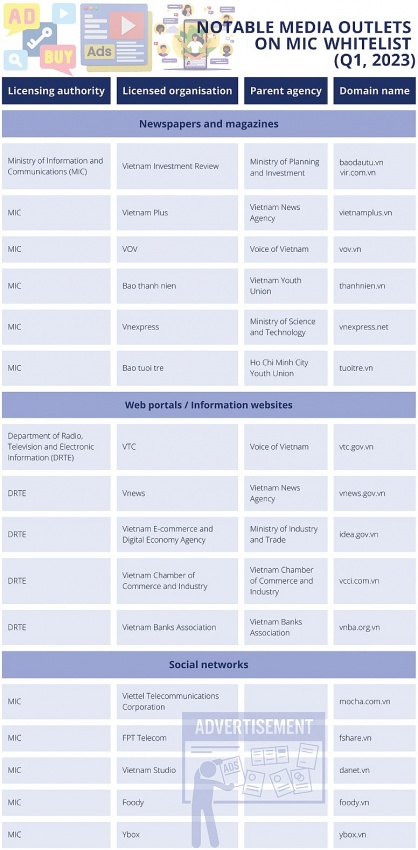New whitelist establishes ad boundaries
 |
| Vietnam’s advertising laws need brought up to speed to match the fast-changing environment, Photo: Shutterstock |
A whitelist issued on March 23 by the Ministry of Information and Communications (MIC) consists of 301 newspapers and electronic magazines, 1,381 general information websites, and 953 social networks, all licensed media outlets recommended for brands to advertise on. This whitelist was accompanied by a document outlining the regulations on online advertising activities in compliance with the law.
“The whitelist will be continually updated, and stricter measures will be implemented in collaboration with cross-border platforms such as Google, YouTube, and Facebook to combat advertising spam and malicious content in Vietnam,” an MIC representative stated.
Along with the newly published whitelist, the MIC mandated that advertising service providers and brands proactively establish their own “blacklist” which publicly identifies brands, agents, advertising distribution platforms, and electronic information pages that engage in illicit advertising practices. This list will serve as a reference for organisations and enterprises to avoid engaging in advertising with such entities.
In 2022, the MIC unveiled a list of 146 websites that provided advertising content for illegal activities such as gambling and prize exchange. Despite strong measures taken, such as penalising brands or artists for false advertising and urging cross-border services to prevent malicious ads, the issue still persists.
The recent measures taken by the MIC have garnered positive reception from the business and marketing communities. Nguyen Pham Hoang Huy, head of the E-commerce Department at FPT Polytechnic School, has expressed that these measures not only promote a fair competitive environment but also safeguard genuine advertisers and enhance brand reputation to protect customers.
Huy further explained that many businesses have taken advantage of cross-border platforms to advertise counterfeit goods, substandard drugs and cosmetics. On the other hand, advertising on traditional mediums such as television or newspapers requires a number of documents to prove the authenticity of the business and the reliability of the products.
These documents range from an advertising licence application, legal certification copies of the advertised products or services, to business registration certificates, and certification of functional foods, cosmetics, foodstuffs, and drugs from competent authorities.
“This has resulted in a significant disparity in censorship, as cross-border platforms such as YouTube and Facebook have lax management while domestic media outlets have to adhere to strict content censorship regulations. This inequality leads to units complying with Vietnamese law losing revenue,” Huy assessed.
Do Xuan Anh, communications manager at FPT Telecom, said that the whitelist ensures brands and businesses have content safety. “It’s now easier for businesses to identify reliable advertising display platforms, and reach the appropriate target audience. This ultimately leads to higher advertising efficiency,” Anh said.
“Therefore, advertising displayed on platforms or locations with healthy information and clean content is vital to ensure the brand’s safety and a healthy business environment,” she added.
In the same vein, Nguyen Quoc Hung, CGO at Tonkin Media, said that it is a reasonable move. “We’ve been waiting for this list for a long time,” Hung said.
Insufficient punishments
In terms of legality, Tran Minh Hung from the Ho Chi Minh City Bar Association highlighted that the Law on Advertising 2012, amended and supplemented in 2018, prohibits certain acts in advertising activities, such as advertising that lacks aesthetics, that is contrary to the traditional history, culture, ethics, customs and traditions of Vietnam, and that influences children with thoughts, words, and actions that are contrary to morality, customs and traditions.
“The government’s decree on sanctioning of administrative violations in culture and advertising also clearly stipulates fines ranging VND40-60 million ($1,700-2,500) for violations of these regulations,” Hung said.
However, in reality, many digital content creators are still using violent and controversial content to attract views and earn advertising money. Regarding cross-border advertising, the law requires advertising service dealers to provide technical solutions for advertisers and advertising issuers to control and remove products with unhealthy content or violating Vietnamese laws.
“However, the tools or filters that Google, YouTube, and Facebook are currently providing are not enough to ensure safety. These cross-border platforms are also not yet active in updating user accounts and channels with malicious content that violates the law,” Hung noted.
To address these issues, Nguyen Truong Son, president of the Vietnam Advertising Association, suggested that in addition to continuously updating the whitelist, the MIC needs to supplement regulations on tightening advertising with strict sanctions.
“The Law on Advertising has been around since 2012, while the advertising industry is constantly changing. Therefore, it is necessary to amend the law to adapt to realistic development,” Son said.
He advised that in order to protect their reputation and avoid legal risks, brands and businesses must actively negotiate with the party running their ads and be bound by specific terms in the contract related to whitelist advertising.
“To clean up the advertising environment, there needs to be smooth coordination between advertisers, brands, and management agencies,” he assessed.
 |
More comprehensive list awaited
The current whitelist, though welcomed, is assessed to be helpful only for big fast-moving consumer goods brands or large corporations with products such as real estate or cars – entities that usually spend up to 80 per cent of their campaign budget on brand recognition.
“Thus, they have the means to spend on highly reputable sites on the whitelist,” said Anh Duc, an advertising expert at one of the top three media companies in Vietnam.
“However, small businesses with limited advertising budgets are looking for a more comprehensive advertising list that can address their specific needs, such as enhanced customer interaction and conversion rates, and are still inclined towards flexible payment models such as per click and social media interaction,” he added.
Duc suggested that the advertising list can be enhanced by adding advertising placements such as blogs and personal pages, which would attract low-cost brands.
Viet Anh, a small business owner in Hanoi, said that he allocates most of his advertising budget towards social networking sites to generate purchases and usage of services. “The existing list serves the purpose of branding. However, small businesses are forced to focus on goals while brand safety and content are not major concern, as the primary goal is to remind customers to use the service,” Anh said.
Hung of Tonkin Media believes that brands and media companies would welcome an official list that is regularly updated to meet their advertising needs. “The ability to cater to advertising needs is expected to improve rapidly,” he said.
 | Vietnam keeps tabs on digital advertising The Vietnamese government’s new initiative on cross-border advertisement on digital platforms like YouTube, Google, and Facebook is deemed a step up from previous legislation, particularly regarding censorship and tax obligations. |
 | The impact on tightening cross-border online advertising rules in Vietnam To enforce more rigorous control of cross-border advertising activities, the Vietnamese government issued Decree No.70/2021/ND-CP dated July 20, amending and supplementing provisions of Decree No.181/2013/ND-CP dated 2013, elaborating on some articles of the Law on Advertising. Decree 70 will take effect on September 15, 2021. |
 | Crafting balanced treatment in cross-border advertising To enforce more rigorous control of cross-border advertising activities, the Vietnamese government issued Decree No.70/2021/ND-CP on July, which took effect on September 15. Thai Gia Han, junior associate at Indochine Counsel, pores over the new conditions applicable to digital advertising in Vietnam and how these impact those who provide cross-border advertising services. |
 | Enforcing robust advertising legislation in Vietnam Not an exaggeration as the saying seems to be, digital advertising produces a turbocharged effect on the rise of the modern internet. Algorithmically targeted programmatic advertising not only drives innovations but also democratises opportunities for companies wishing to reach diverse population demographics. Cross-border advertising services are thus increasingly offered to anyone who aims to achieve mass persuasion and scale up globally. |
What the stars mean:
★ Poor ★ ★ Promising ★★★ Good ★★★★ Very good ★★★★★ Exceptional
Related Contents
Latest News
More News
- PM outlines new tasks for healthcare sector (February 25, 2026 | 16:00)
- Ho Chi Minh City launches plan for innovation and digital transformation (February 25, 2026 | 09:00)
- Vietnam sets ambitious dairy growth targets (February 24, 2026 | 18:00)
- Masan Consumer names new deputy CEO to drive foods and beverages growth (February 23, 2026 | 20:52)
- Myriad risks ahead, but ones Vietnam can confront (February 20, 2026 | 15:02)
- Vietnam making the leap into AI and semiconductors (February 20, 2026 | 09:37)
- Funding must be activated for semiconductor success (February 20, 2026 | 09:20)
- Resilience as new benchmark for smarter infrastructure (February 19, 2026 | 20:35)
- A golden time to shine within ASEAN (February 19, 2026 | 20:22)
- Vietnam’s pivotal year for advancing sustainability (February 19, 2026 | 08:44)

 Tag:
Tag:




















 Mobile Version
Mobile Version